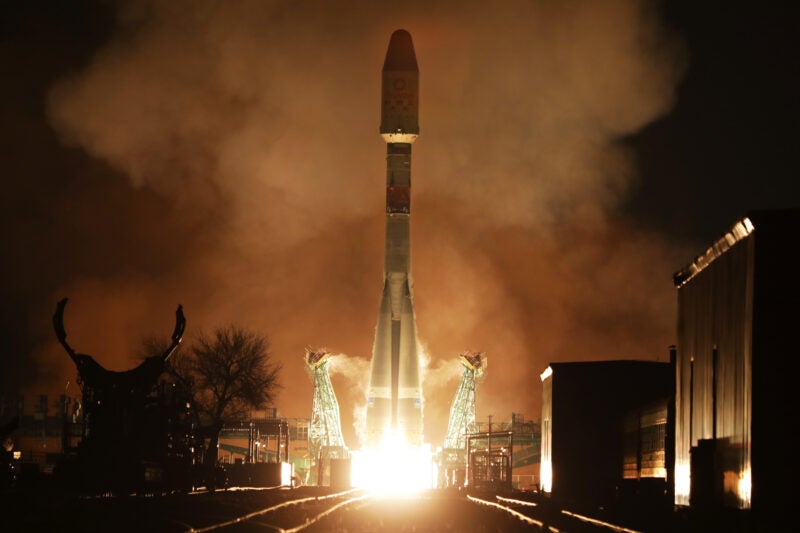OneWeb Suspends Launches From Baikonur, Arianespace Suspends Soyuz Launches

Arianespace launches 36 satellites for OneWeb from the Baikonur Cosmodrome on Dec. 27. Photo: Arianespace/OneWeb
OneWeb’s board of directors voted to suspend all launches from the Baikonur Cosmodrome in Kazakhstan, and Arianespace is suspending Soyuz launches as the companies rejected steep demands from the Russian space agency Roscosmos. This development could impact OneWeb’s plans to start commercial service, NSR analyst Claude Rousseau tells Via Satellite.
On Wednesday, Roscosmos Director General Dmitry Rogozin said an upcoming Arianespace Soyuz launch from Baikonur would not take place unless OneWeb guaranteed its satellites would not be used for military purposes and the United Kingdom withdrew as a shareholder.
OneWeb’s board announced the “no” vote on Thursday morning.
On Friday, Arianespace said it is suspending Soyuz launches operated by Arianespace and the Starsem Russian affiliate. Arianespace is following sanctions from the European Union, United States, and United Kingdom issued because of Russia’s invasion of Ukraine. Soyuz is a Russian-made rocket, and the Arianespace/Starsem operation is governed by an international agreement between France, Russia, and the European Space Agency (ESA).
This follows after earlier in the week, Roscosmos suspended cooperation with Europe on launches from the Guiana Space Center (CSG) and withdrew its technical staff as the spaceport is preparing for a European Galileo satellite launch on a Soyuz rocket.
“This operation began after the end of the Soviet Union and has been very successful up to now. However, it is now challenged by Roscosmos’ unilateral decision to withdraw from CSG and suspend all Soyuz launches from Europe’s Spaceport,” Arianespace said in a statement.
Arianespace said the readied Soyuz launchers and Galileo satellites are in stable configuration and in security. As for the OneWeb launch, Arianespace said it has been postponed indefinitely, and Arianespace “will work with its partners to ensure the well-being of the goods and means currently in Baikonur.”
Roscosmos plans to keep payment for the launch, which has been paid in full. The money will remain in Russia, Rogozin said.
Kwasi Kwarteng, the United Kingdom Secretary of State for Business, Energy and Industrial Strategy, tweeted Thursday that the U.K. government supports OneWeb’s decision. Kwarteng had responded to the demands on Wednesday, saying there was “no negotiation” with Russia.
“In light of Russia’s illegal and unprovoked invasion of Ukraine, we are reviewing our participation in all further projects involving Russian collaboration,” Kwarteng tweeted Thursday.
OneWeb Could Risk Bankruptcy With Launch Delay
OneWeb surely knew the risks of working with Russia to launch its satellites, but the company could now be at risk of another bankruptcy if its launches are long delayed, NSR’s Rousseau tells Via Satellite.
OneWeb — which has not made a larger statement on the situation — was planning for more Arianespace launches this year on Soyuz rockets to build up its constellation and start commercial service. The most recent launch from Baikonur on Feb. 10 brought the constellation to 428 satellites — 66% of the planned LEO satellite fleet.
The LEO operator is likely exploring options with Arianespace, he said. While Arianespace has five more Ariane 5 launches scheduled before the rocket is retired, its successor, the Ariane 6, is not ready yet. In addition, the lighter lift Vega-C would not be as optimal for OneWeb’s payload size.
OneWeb would face a similar payload size challenge with Rocket Lab’s Electron rocket, Rousseau said. Although Indian company Bharti Global is the largest shareholder in OneWeb, there may be geopolitical concerns that could prevent OneWeb from pursuing a launch in India with Indian Space Research Organisation (ISRO). That leaves OneWeb with Mitsubishi Heavy Industry’s HII vehicle and SpaceX’s workhorse Falcon 9, but OneWeb may balk at launching with a direct broadband competitor.
Restarting the launch campaign at Baikonur would be the easiest option if it was possible, Rousseau said.
“My bet is that this is stalled for a few months, unless they find a really quick solution,” he said. “This also supports what [NSR has] been saying about the supply of launchers — it’s dreadful.”
Rousseau expects nations to now double down on investment in native launch capabilities, especially the United Kingdom, which has a number of launchers in development hoping to reach orbit in the near future.
The holdup affects not just OneWeb and Arianespace commercially and financially, but also manufacturer Airbus OneWeb Satellites, and OneWeb’s global consortium of investors with Bharti Global, the United Kingdom government, Eutelsat, Softbank, and Hughes Network Systems, which has a joint venture in India with Bharti Global.
“They’re just going to have to be patient, but I don’t know if the investors can be that patient. I would not exclude another bankruptcy because of this,” Rousseau. “It is a situation that is showing the limits of international cooperation.”
“There’s a lot of ramifications — where the satellites are being built, who’s funding it, where the services are going to be offered,” he added. “For some of us that are watching this space, we never thought that there would be a war that would have an impact on the LEO market.”
Editor’s note: This story was updated March 4 with the Arianespace suspension news and NSR comments.